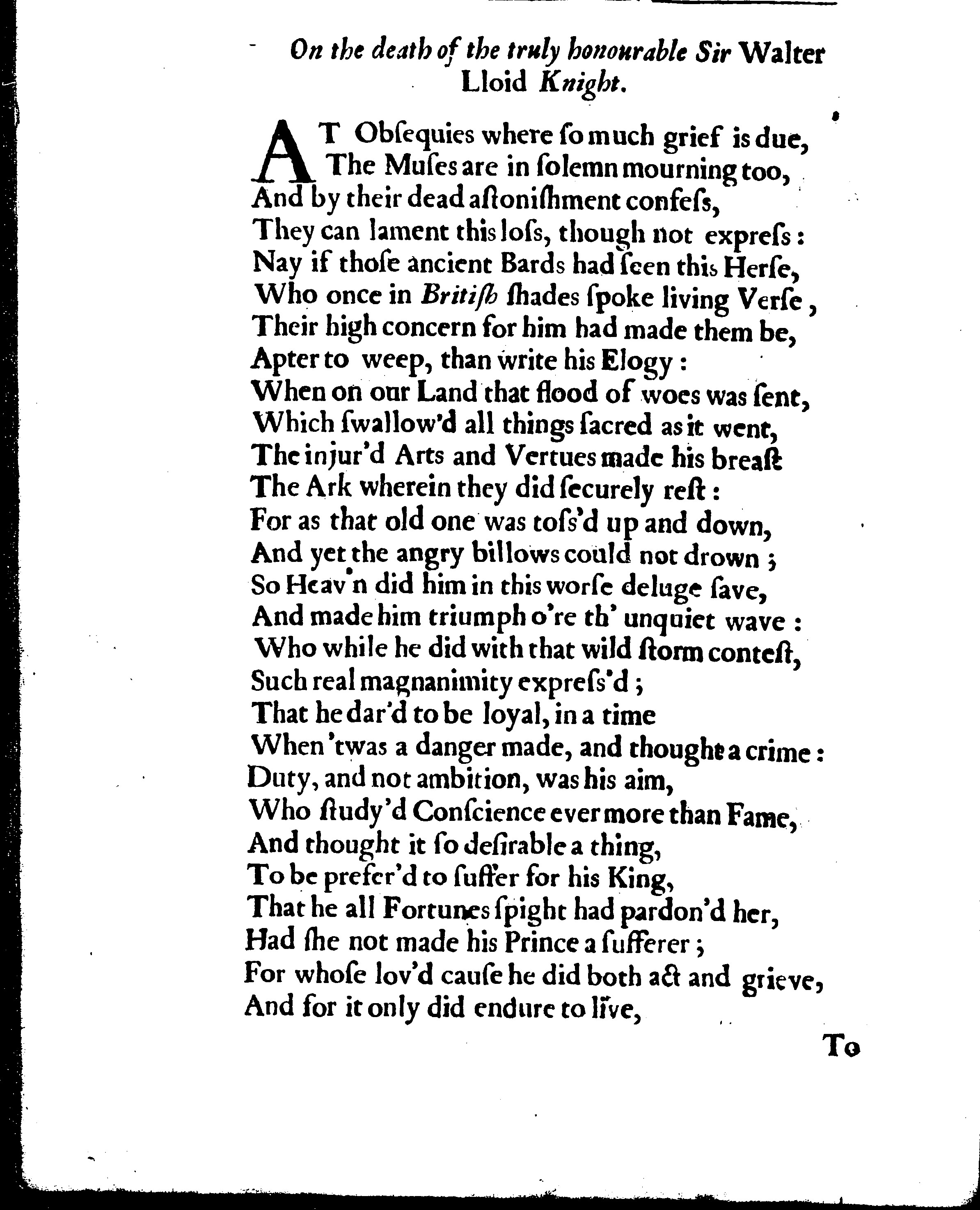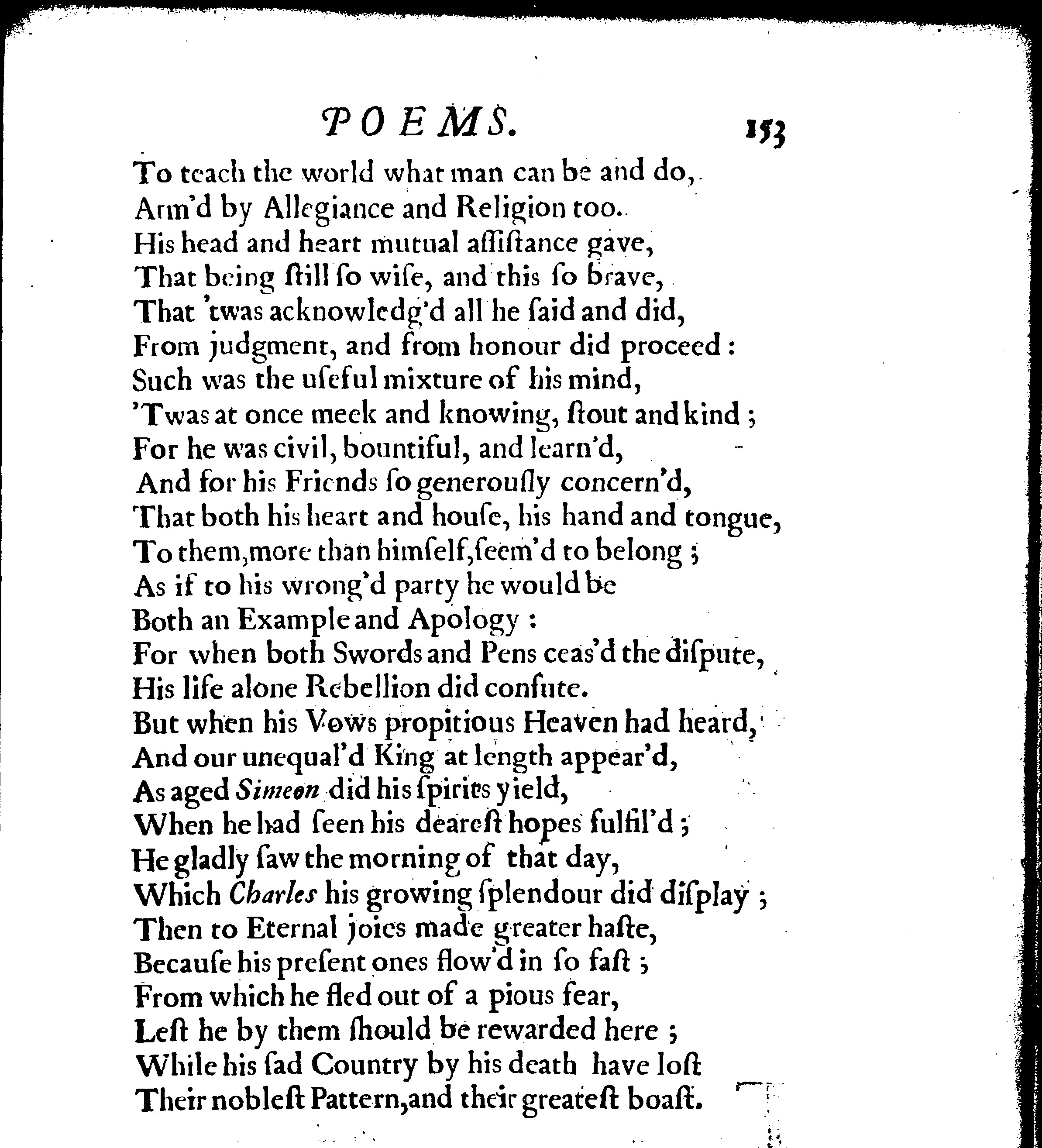"On the death of the truly honourable Sir Walter Lloid Knight"
By
Katherine Philips
Transcription, correction, editorial commentary, and markup by Staff and Research Assistants at The University of Virginia, John O'Brien, Sara Brunstetter, Rachel Retica
Lloyd The Royalist Sir Walter Lloyd (1580-1662?)
was the High Sheriff of Cardiganshire in 1621. He was knighted in 1643; several years later, in the charged political climate of the late 1640s, his estates were sequestered.ObsequiesA funeral or burial rite (Oxford English Dictionary).MusesThe nine daughters of Zeus who presided over and inspired
learning in the arts and sciences (Oxford English Dictionary).BardsLyric or epic poets who traditionally sang
their verse accompanied by a harp (Oxford English Dictionary). HerseAlternate spelling for hearse (n.): wooden structure
decorated with lighted candles, banners, and notes, including epigraphs
and poems, at a noble or royal funeral (Oxford English Dictionary).FloodPhilips is referring to the
English Civil War (1642-1651). The war took place between the Protestant
rebels and the Catholic monarchy of England. Oliver Cromwell led the
Protestants to victory, and King Charles I was beheaded in 1649 to usher in
the twelve-year Interregnum.King King Charles I.PropitiousGiving or indicating
a good chance of success; favorable (Oxford English Dictionary).SimeonSimeon of the
New Testament (Luke 2:25-26) was a prophet whom the Holy Spirit
promised would not die until he had seen Jesus Christ.CharlesKing Charles II was Coronated in 1661 after
the death of Oliver Cromwell.
152
1At ObsequiesObsequiesObsequiesA funeral or burial rite (Oxford English Dictionary). where so much grief
is due,
2The MusesMusesMusesThe nine daughters of Zeus who presided over and inspired
learning in the arts and sciences (Oxford English Dictionary). are in solemn mourning
too,
3And by their dead astonishment confess,
4They can lament this loss, though not express:
5Nay if those ancient BardsBardsBardsLyric or epic poets who traditionally sang
their verse accompanied by a harp (Oxford English Dictionary). had seen this HerseHerseHerseAlternate spelling for hearse (n.): wooden structure
decorated with lighted candles, banners, and notes, including epigraphs
and poems, at a noble or royal funeral (Oxford English Dictionary).,
6Who once in British shades spoke living
Verse,
7Their high concern for him had made them be,
8Apter to weep, than write his Elogy:
9When on our land that flood of
woesFloodFloodPhilips is referring to the
English Civil War (1642-1651). The war took place between the Protestant
rebels and the Catholic monarchy of England. Oliver Cromwell led the
Protestants to victory, and King Charles I was beheaded in 1649 to usher in
the twelve-year Interregnum. was sent,
10Which swallowed all things sacred as it went,
11The injur'd Arts and Vertues, made his breast
12The Ark wherein they did securely rest:
13For as that old one was toss'd up and down,
14And yet the angry billows could not drown;
15So Heav'n did him in this worse deluge save,
16And made him triumph o're th' unquiet wave:
17Who while he did with that wild storm contest,
18Such real magnanimity express'd;
19That he dar'd to be loyal in a time
20When 'twas a danger made, and thought a crime:
21Duty, and not ambition, was his aim,
22Who study'd Conscience ever more than Fame,
23And thought it so desirable a thing,
24To be prefer'd to suffer for his KingKingKing King Charles I.,
25That he all Fortunes spight had pardon'd her,
26Had she not made his Prince a sufferer;
27For whose lov'd cause he did both act and grieve,
28And for it only did endure to live,

